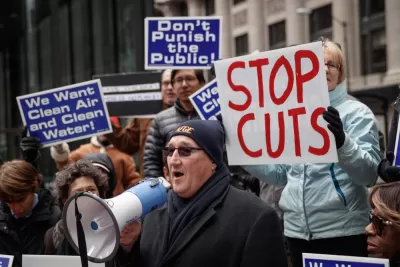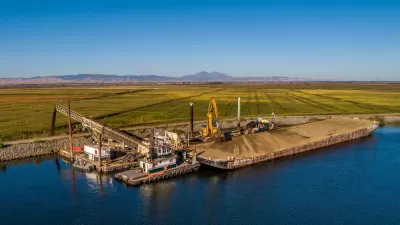Does environmental justice need its own office to help vulnerable populations impacted by pollution, or can all divisions within the EPA address the issue? The Office of Environmental Justice, established in 1993, may be shut down.

No agency will suffer a greater percentage drop in President Trump's proposed 2018 budget than the U.S. Environmental Protection Agency: a loss of $2.6 billion from current levels, or 31 percent, reported The New York Times on March 16 in an earlier post about how the budget cuts will affect two of American's greatest water resources: the Great Lakes and the Chesapeake Bay.
Costing far less money, about $2 million a year, but addressing a national problem is the Office of Environmental Justice which "works to protect human health and the environment in communities overburdened by environmental pollution by integrating environmental justice into all EPA programs, policies and activities."
"An EPA spokesperson suggested in a statement that the agency doesn’t need a special arm devoted to environmental justice to continue this work," reports Talia Buford, who covers disparities in environmental impacts for ProPublica.
"Environmental justice is an important role for all our program offices, in addition to being a requirement in all rules EPA issues,” the statement said. “We will work with Congress to help develop and implement programs and continue to work within the Agency to evaluate new ideas to properly address environmental justice issues on an agency-wide basis.“
To some extent, though, Democrats may share some blame for the jeopardy that the office "to advocate for minorities and the poor, populations most likely to face the consequences of pollution and least able to advocate for themselves," finds itself in today, adds Buford.
[I]t’s become achingly apparent that well before Trump, those who purported to champion environmental justice — primarily Democratic legislators and presidents — did little to codify the progress and programs related to it, even when they were best positioned politically to do so.
Sen. Cory Booker of New Jersey and other Democrats are racing to file bills that save the Office of Environmental Justice and similar initiatives on an emergency basis, though they know they have little chance of success.
Sadly, one can read about the the big plans the office had last October to recognize the profundity of the saying, "elections have consequences." Surprisingly, the EJ 2020 Action Agenda still exists on the EPA website.
Hat tip to Dino Grandoni, Energy and Environmental reporter at The Washington Post.
FULL STORY: Has the Moment for Environmental Justice Been Lost?

Maui's Vacation Rental Debate Turns Ugly
Verbal attacks, misinformation campaigns and fistfights plague a high-stakes debate to convert thousands of vacation rentals into long-term housing.

Planetizen Federal Action Tracker
A weekly monitor of how Trump’s orders and actions are impacting planners and planning in America.

San Francisco Suspends Traffic Calming Amidst Record Deaths
Citing “a challenging fiscal landscape,” the city will cease the program on the heels of 42 traffic deaths, including 24 pedestrians.

Defunct Pittsburgh Power Plant to Become Residential Tower
A decommissioned steam heat plant will be redeveloped into almost 100 affordable housing units.

Trump Prompts Restructuring of Transportation Research Board in “Unprecedented Overreach”
The TRB has eliminated more than half of its committees including those focused on climate, equity, and cities.

Amtrak Rolls Out New Orleans to Alabama “Mardi Gras” Train
The new service will operate morning and evening departures between Mobile and New Orleans.
Urban Design for Planners 1: Software Tools
This six-course series explores essential urban design concepts using open source software and equips planners with the tools they need to participate fully in the urban design process.
Planning for Universal Design
Learn the tools for implementing Universal Design in planning regulations.
Heyer Gruel & Associates PA
JM Goldson LLC
Custer County Colorado
City of Camden Redevelopment Agency
City of Astoria
Transportation Research & Education Center (TREC) at Portland State University
Jefferson Parish Government
Camden Redevelopment Agency
City of Claremont





























